Juventud Rebelde 221
Online Discussion of Sexual Fantasies

Online Discussion of Sexual Fantasies
Have you ever wondered if your sexual fantasies and practices are common or can be considered dysfunctional? Participate in this discussion with the section Sexo Sentido, which on the occasion of its twenty years has prepared many initiatives. Come and see.
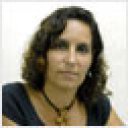 By Mileyda Menéndez Dávila
By Mileyda Menéndez Dávila
A CubaNews translation.
Edited by Walter Lippmann.
Have you ever wondered if your sexual fantasies and practices are common or can be considered dysfunctional? How can you satisfy them without harming your health or committing crimes? Next Thursday, January 30th you can ask several specialists from Cenesex about this subject, who will visit JR’s digital newsroom for an online interview. You can also forward your questions to digital@juventudrebelde

Lawfare on the Bench

Lawfare on the Bench
A non-binding investigation could show the dirty methods that certain judicial systems use to engage in politics… also very dirty
By Marina Menéndez Quintero
January 25, 2020
Translated and edited by Walter Lippmann for CubaNews.
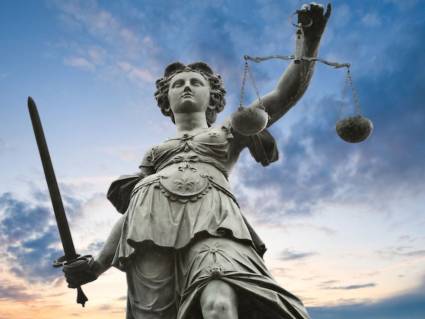
lawfare Author: Taken from the Internet Published: 25/01/2020 | 07:38 pm
Chilling tales of lies, slander and unjust prison sentences could come to the fore, totally naked, if nothing blocks the work of the judges who make up an unusual court: the Ethics Tribunal which has set out to investigate – and ventilate! – the most notorious cases of lawfare.
Perhaps because the court is presided over by an Argentine constitutionalist magistrate – the prestigious and experienced Eduardo Barsesat – or because the news has had wide repercussions in his country, the media has pointed out that the entity is a creation of “sectors close to Kirchnerism” .
However, Barsesat explained that the idea had been around for two years and, in fact, it was conceived in Madrid, not in Buenos Aires. It was in the Spanish capital that the foundation of the court was first announced last November, and the city in which its ruling will also be announced exactly one year later, next November.
According to the magistrate’s statement to the alternative media El Destape Radio, this is “a joint initiative of the Lawfare Institute of Sao Paulo, which includes Lula’s defense lawyers, and the Common Action Forum of African countries.
The lawyer – who has participated as a prosecutor and judge, respectively, in two other ethical judicial processes (the one that was developed to establish the responsibilities of the Argentine military dictatorship and the one that analyzed crimes for economic, social and cultural crimes) – is concerned that lawfare “is not foreseen in any international doctrine” and constitutes, he says, “a perverse practice that generates the civil death” of those who are its victims.
“Many believe that the processes that disqualified Lula from being a presidential candidate or that they used here to persecute Cristina (Fernández) or to outlaw (Rafael) Correa, are normal processes; and we want to demonstrate that they are irregular,” he explained to other media.
“It’s a judicial persecution in which nobody is very sure of what their rights are,” he said in one of the many interviews he has given in recent days, while denouncing the digital publication Perfil: “Lawfare, or judicial warfare, which would be its meaning in Spanish, is a practice of persecution and destruction of political opponents or enemies, using judicial processes as a weapon.
In accordance with the announcement, the Ethics Tribunal that has just been set up will issue summonses and collect testimonies and documents, interview detainees and then issue an ethical judgement.
Barsesat is not too concerned that such a ruling will not lead to effective penalties.
In an article close to a declaration of principles about the functioning of the court and signed by the jurist himself in El Destape, Barsesat recognizes that, in the face of what he calls “a new modality of the former doctrine of “national security” – and which operates, fundamentally, by implementing the rotten leg of the administration of justice – it is difficult to expect a trial of lawfare before the same judges who are its executors and ideological supporters.
“Nor are there any jurisdictional bodies, regional or international, that can operate with training and authority to disrupt the lawfare,” he adds.
However, it also takes into account that there is a need to “make people aware of the irregularity and anti-juridicality of this phenomenon, while advancing in “the task of making people aware of this new instrument of social domination, and opening up paths for future challenges before judicial bodies, national, regional and international.
These political crimes will not be the only ones to be tried, as they could be considered.
What Barsesat calls “a new undertaking of that juridical consciousness of humanity that comes from a resolution of the CAF (the Common Action Forum), to constitute the Common Action Tribunal (the name of this very special court)”. It also intends to prosecute the practice that he identifies as whistleblowing: “the persecution as informants, of those who make public data described as secret by the hegemonic powers,” he explains.
And one wonders if it would be possible, then, to also analyze the persecution that keeps the Australian journalist Julian Assange virtually under kidnapping. Unfortunately, many in the world seem to have forgotten the effectiveness of the leaks that published, in black and white, the hairs and signs of the warlike execution of W. Bush. This was thanks to the audacity of his web site Wikileaks. The same could be said of then Sergeant Bradley Manning (Chelsea Manning).
Big Game Hunting
There is reason to wonder whether the penetrated judicial systems that have put this practice into effect will allow the court headed by Barsesat and composed of also experienced jurists from other nations to proceed, when they require files, or the “evidence” that in many cases does not exist?
But the truth is that his appearance could not be more fair and timely.
A look at recent events in Latin America – just to look at this part of the world – and even a glance at the events that are taking place right now, allows us to see how recurrent the use of “the judicial war”, or “the judicialization of politics”, as it is more commonly known, is to stone not only progressive or frankly leftist political leaders. It is also being used to demonize movements and parties, to twist the destinies of some countries and, of course, to criminalize political processes.
The case of Luiz Inácio Lula da Silva, who was confined in an improvised prison at the police headquarters in Curitiba for a year and a half after a trial that was rushed to a close when the resources of the defense had not yet been exhausted, and against whom some six legal cases are still open on unproven charges, so that his freedom is still not definitive, is the most notorious.
He was succeeded by his fellow worker and co-religionist of the Workers’ Party, Dilma Rousseff, the first piece of work to be broken in Brazil by means of treason, distortion and lies, in an impeachment that anticipated the political play in gestation.
Also victims of lawfare are former Ecuadorian Vice President Jorge Glas, locked up and then transferred to an inhospitable maximum security prison for acts that were not sufficiently proven and considered corrupt. Also, former President Rafael Correa himself, prevented from returning to Ecuador by the arrest warrants circulated to Interpol against him,. These are also on the basis of unproven accusations that have ranged from an alleged attempt to kidnap a congressman to the presumption that he was organizing a coup d’état. It’s a fantasy!
But the judicial persecution has also been hung on less prominent figures such as former ministers or ex-officials of the Argentine governments of “the Kirchners”. It is still hanging over Vice President Cristina Fernandez, accused of several alleged acts of corruption, and the first voice to denounce lawfare as a way of judicializing politics.
In any case, if anyone doubts the artful and opportunistic way in which this is being employed, they need only look at Bolivia. Evo Morales, who left the country after being threatened by the military to prevent the coup d’état from ending in a massive bloodbath, has now been accused by the coup leaders of “terrorism” and “sedition”.
And less than 24 hours after his name was included on the Movement Toward Socialism (MAS) ballot for the announced presidential elections in May, former minister Luis Arce has just been included among those accused of alleged embezzlement from the Indigenous Fund. Here is another way to prevent the MAS from regaining the presidency!
However, such examples are not the only ones that are outrageous. Glenn Greenwald, the U.S. journalist who runs the website The Intercept in Brazil. He published, along with two other colleagues, the audios that prove how the trial against Lula, in the midst of Operation Lava Jato, was “fabricated”. They followed the instructions of the prosecutor-turned-Justice Minister Sergio Moro, another one being pursued by “justice”, which accuses him of committing computer piracy and cyber-crimes.
Dr. Bersesat is right when he explains that lawfare is based, among other things, on fictional stories. What is not fiction at all is its extermination character, as could only happen to the minds that are credited with its creation in 2001 as part of the U.S. military’s doctrines of domination and unconventional methods.
TRANSLATOR’S NOTE:
Lawfare is a form of war consisting of the use of the legal system against an enemy, such as by damaging or delegitimizing them, tying up their time or winning a public relations victory.[1][2] The term is a portmanteau of the words law and warfare.
https://en.wikipedia.org/wiki/Lawfare
Ballot Boxes in a Minefield

Ballot Boxes in a Minefield
The punitive measures that continue to be implemented in a hurry by Jeanine Áñez’s illegitimate executive, sow doubts about the path towards the announced elections in Bolivia
 By Marina Menéndez Quintero marina@juventudrebelde.cu
By Marina Menéndez Quintero marina@juventudrebelde.cu
January 13, 2020
A CubaNews translation.
Edited by Walter Lippmann.
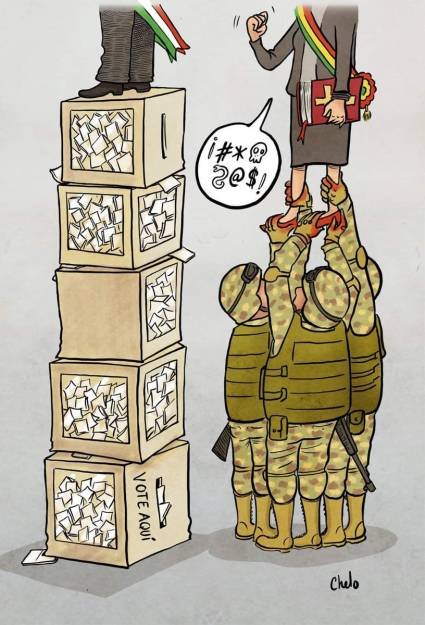 Each day that passes sows more scepticism about the cleanliness of the elections announced by Jeanine Áñez. She is the head -only the visible head, of course- of the executive under which a blow is masked that continues, while the breakup of Evo Morales’ refoundational work does not cease. And this includes society as a whole… and individuals.
Each day that passes sows more scepticism about the cleanliness of the elections announced by Jeanine Áñez. She is the head -only the visible head, of course- of the executive under which a blow is masked that continues, while the breakup of Evo Morales’ refoundational work does not cease. And this includes society as a whole… and individuals.
The harassment of the masses in the streets – which characterized the first days after the military’s “commotion” of the reelected President to leave – has been followed by selective repression that in various ways, as is the practice in the unconventional wars in now in vogue. These include imprisons, segregation, demonizing and persecuting while trampling and destroying everything that the Movement Toward Socialism (MAS) had built. The actions of the usurpers are by presidential decree, as they should be.
The signs are seen, precisely, in this devastating effort, undertaken with speed and urgency as if it were a matter of leaving no trace of the society that was built during the most recent 14 years. It’s as if it were necessary for Bolivia to enter “aseptically” in the period that will open when Áñez – as “God commands” – will hand over the position she illegally holds, since, moreover, she is supposed to be heading a transitional government.
It is only because of this desire to exterminate that we could talk about “cleaning up” in Bolivia today.
Some headlines are enough to show what is happening and to confirm, in passing, the transcendent role that “the media” continues to play in the Bolivian panorama, first bombarded, as has been denounced, by sophisticated work on social networks that includes the tens of thousands of fale Twitter accounts opened to support the coup.
Added to this are these media that, just yesterday, were spreading the work of the MAS and in 24 hours took on the lying discourse of the coup leaders. In this way, they were also showing the brutal way in which the official communication channels have been taken over and are used to manipulate.
With bayonets, and without them
There is a lot of crudeness, however, in the projection of these media, so that someone moderately aware of the truth does not read between the lines. This is how one can infer the interested sponsorship of the so-called “civil resistance” groups, a term coined in Bolivia during the uprising to attribute the positions of the coup leaders to those from below. They were pretending that they had support in the people, and which is now used to disguise the identity of paramilitary groups – that’s how Evo has called them – that replace the military and police forces in the persecution of the Morales government leaders.
In this way, one of these groups surrounded the home of the former government minister, Carlos Romero, “to avoid a possible escape,” said ABI, until the saving declaration arrived from the now appointed head of that ministry, Arturo Murillo – a man who seems to give more orders than Áñez herself – saying that Romero “has no formal accusation and absolutely nothing yet (…); then, he can circulate on the streets normally.
But not everyone has had the same “luck” as the former Romero. A woman identified only as an “employee” of former presidential minister Juan Ramon Quintana – a wanted man who has been given protection by the Mexican Embassy, which is still guarded and surrounded – was arrested on Thursday at an airport, accused of attempting the “irregular” transfer to Argentina of an unusually large sum of money.
In this way, the most atrocious persecution is orchestrated, which does not even use false charges and makes one think, at times, of the possibility of a lynching.
On the other hand, the hunt advances by means of the false criminal proceedings that once again remind us of how politics is judged in Latin America.
No less than 592! people will be investigated by the Attorney General’s office just for being in “the top” of MAS, for having occupied some “position of authority” during their terms, or even for being a relative of one of them.
The announcement was made by Alvaro Coimbra, who has been given the Justice portfolio. He said that among those being investigated are all those who have held state functions between 2006, the date of Morales’ arrival to the presidency, and last November.
It is alleged that the aim is to identify and judge those who have committed “corrupt acts of corruption”. The suspected investigation will work on a list that includes senior politicians, government officials, judicial officers, military personnel, senior executives of state-owned companies and important political party officials, according to the alternative web publication Tercera Información.
“The de facto justice minister is violating the CPE by presuming the guilt of 592 former MAS officials and their families. He puts himself above the judges by passing sentence, without a prior trial. The regime of Áñez, Mesa and Camacho is violent, a sower of false evidence and a slanderer”, Evo denounced in his Twitter account.
But there is a growing threat to him. In addition to the charges of “terrorism” and “sedition” that are falsely attributed to him, the coup leaders have now “requested” that Interpol activate an international arrest warrant for him.
Dubious environment
In such a scenario of persecution, with hundreds of MAS leaders and social activists imprisoned or threatened by corrupt judicial processes, it has been announced by the current Supreme Electoral Tribunal – renewed by the coup d’état, with a hand-picked membership and departments where it was not possible to propose candidates – that the elections will take place on May 3.
With these elections, the coup regime hopes to pass the baton and give itself a facelift. The MAS, in a daring decision, is going to the electoral tournament to recover the space that has been stolen from it, in an artful way, in Bolivian institutions.
Although the registration period for candidates closes on February 3, there are already candidates linked to the usurpation who have confirmed their candidacy, such as Carlos Mesa, Evo’s main rival and loser in the unknown elections of October. It was Mesa who set in motion the strategy of the alleged fraud since before those elections. Then there is the Santa Cruz coup-plotter and civic leader Fernando Camacho, who is already campaigning in Cochabamba, the bastion of Evo and the MAS, and the Korean-born Bolivian Chi Hyung Chu, who, like Mesa, is running again after the October elections.
The MAS has yet to reveal its candidates, which it has announced it will do in the coming days. But they are using names like former Foreign Minister David Choquehuanca, the also former head of the Economy Department Luis Arce, or the young coca growers’ leader Andrónico Rodríguez, who has just denounced the existence of “a systematic operation to behead and destroy the leadership of the Movement Toward Socialism,” and the attempt by the de facto executive to disqualify him, presenting him to the population “as the radical, as the one who seeks death and violence, and that is totally false,” he said.
Not only does the massive participation of its followers in the expanded meeting that took place in December in Cochabamba show the roots of the MAS.
An early poll released in recent days, and when the identity of the MAS candidates has not yet been revealed, gave whoever represented it the highest percentage of voting intentions (20.7 percent), above the usurper Áñez (15 percent, although she says she will not run), and Carlos Mesa (13.8 percent), among other hypothetical contenders.
However, it is doubtful that the coup d’état would allow clean and transparent elections like those he said he would demand in October: it was they who burned amphorae, committed violence, and dirtied the game to reinforce the false accusation of fraud that “justified” Evo’s deposition.
Another element, external, not only shows where the umbilical cord of that Bolivian coup is tied, but also allows one to guess what purposes that cord feeds.
Donald Trump has just announced the resumption of the so-called aid for the anti-drug struggle that Morales resigned due to the lying and interfering nature of that combat from the United States, and from its representative, the DEA.
The most eloquent thing is not that the mendacious Republican President returns to the usurpers the money that the Bolivian refoundation resigned, but the reason why he is giving it now.
According to Trump, Bolivia “is vital” to his country. And he has just discovered this after the coup leaders called for elections. It is not difficult to see what the aid is really for, and what he is looking for.
Letting It All Hang Out

Letting It All Hang Out
Dialogue, discussion and the search for solutions to cracks in the work of the UJC characterized the 11th Evaluation Assembly. of the organization in the Pinar del Río municipality of Viñales
By Zorileidys Pimentel Miranda
December 22, 2019
Translated and edited by Walter Lippmann for CubaNews.
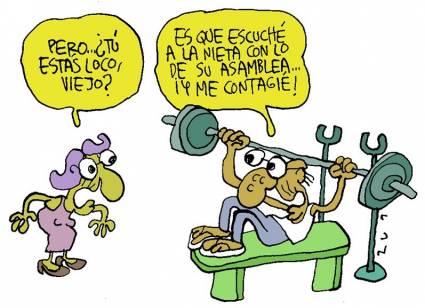
SHE: Are you crazy, old man? HE: I heard the grandchild at your assembly and I caught the urge!
Viñales, Pinar del Río – To transform, propose new ideas and enrich the work of the Young Communist League (YCL); to build spaces for self-criticism and deep discussion; to bring joy and responsibility to the tasks… The proposals are diverse, but they all seek a common goal: to make the YCL an organization with which the new generations feel committed and in which they see their interests well represented.
These times require the dynamism, creativity, and enthusiasm of the youth. Today the YCL also advocates strengthening of political and ideological preparation, knowledge of history, defense of the country and work in social networks to confront the subversive campaigns of imperialism against the Cuban Revolution.
This is what the delegates from Viñales to the 11th Evaluation Assembly. Congress, a space in which the people of Pinar del Río talked “with their shirts off”, about the main difficulties that threaten the adequate functioning of the organization in this territory.
“Enough of incorporating young people to fill the numbers. We have to focus on growing with those who really feel committed to this militancy, to the Revolution and to the tasks it assigns us,” said the secretary of the base committee of the Dos Hermanas camp, who works as a recreation technician.
He was right when he said: “Hence the importance of creating meeting spaces that allow interaction, getting to know each other and sharing our experiences. In this sense, Diosvany Acosta Abrahante, a member of the National Bureau of the UJC, urged the generation of proposals that would bring about a real change of mentality in the youth universe.
We need to guarantee greater incorporation to the ranks of the UJC. This is one of our work priorities; but it is not a question of doing it to fulfill a form, but to find creative solutions among all of us and to act as the vanguard that is the organization of the new generations, he pointed out.
“Another of the central aspects, I would say, is that we must demonstrate in each space that the youth are not lost, and that we are interested in the problems of the country. We are concerned about actively participating in voluntary work, camping, special mornings and all the activities that the UJC calls for,” said Daimarys Arteaga a pre-university student.
“Those of us who are self-employed, for example, have to be more prepared, to know about our past, the current situation of the country… because on many occasions we interact with tourists who ask us about how people live in Cuba, and that is when we have to present them with arguments to defend our truth,” said Lisandra Arencibia Llanes, who has been working in the non-state sector for four years.
In each of the views presented in the evaluation assembly, it was evident, as Acosta Abrahante said, that these are times to implement, multiply and socialize with the entire youth universe, and above all to understand that the base committee is an essential part of the effort to strengthen the internal life, structures and work of the UJC.
AMLO Offers 4000 Jobs to Migrant Caravan

López Obrador Offers 4000 Jobs to New Migrant Caravan
Migrants, seeking to reach US soil to seek asylum, are now in Guatemala.
by Juventud Rebelde digital@juventudrebelde.cu
January 17, 2020
A CubaNews translation.
Edited by Walter Lippmann.
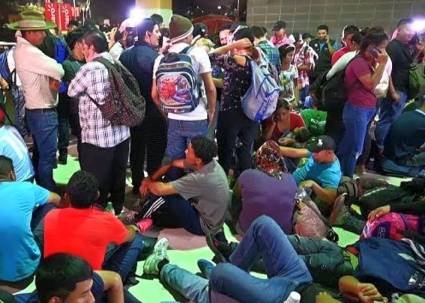 MEXICO CITY, January 17.- Mexican President Andres Manuel Lopez Obrador reported Friday the availability of 4,000 jobs in the southern border of the country for the migrants who are part of the caravan that left Wednesday from Honduras toward the United States.
MEXICO CITY, January 17.- Mexican President Andres Manuel Lopez Obrador reported Friday the availability of 4,000 jobs in the southern border of the country for the migrants who are part of the caravan that left Wednesday from Honduras toward the United States.
About 2500 to 3000 migrants come in the caravan from Honduras, and El Salvador, López Obrador said during his daily news conference, in which he announced the existence of 4000 jobs available on the southern border, he said.
The migrants, who are trying to reach U.S. soil to seek asylum, are now in Guatemala. The new president of that country, Alejandro Giammattei, said that the Mexican Executive, through its foreign minister Marcelo Ebrard, assured him that it [Mexico] would prevent the entry of the new caravan.
The Mexican government has warned us that it will not let them pass, that it will use everything in its power to stop them,” Giammattei told local media, according to RT.
Nearly 1,000 people gathered in the Great Metropolitan Central, in San Pedro Sula, in northern Honduras, to start the new caravan that aims to reach the U.S. in its flight from violence, poverty and lack of employment in that Central American country.
In September 2019, President Donald Trump reached an agreement with his Honduran counterpart, Juan Orlando Hernandez, to supposedly improve asylum capacity by containing the flow of migrants from other Central American countries.
In addition, the U.S. signed a similar agreement with Jimmy Morales, former president of Guatemala, for them to become a safe third country and for Salvadoran and Honduran migrants to seek asylum in that Central American nation, not in the U.S.
On the other hand, he pressured the López Obrador government to stop migration from Central America, in exchange for not imposing tariffs on Mexican products that are exported to the United States.
Women and Anti-Wrinkle Cream

Woman Falls into Coma After Using Anti-Wrinkle Cream
The affected person’s body contained abnormally high levels of methylmercury, a highly toxic element that can cause permanent damage to the nervous system
By Juventud Rebelde digital@juventudrebelde.cu
Published: Saturday 28 December 2019 | 09:25:37 am
Translated and edited by Walter Lippmann for CubaNews.

California Toxic Face Cream Alert Author: Twitter Posted: 28/12/2019 | 09:22 am
WASHINGTON, December 28.- A Sacramento woman was poisoned by a skin cream, leaving her in a coma. Hers was the first reported case of methylmercury poisoning in the United States, reports the Center for Disease Control and Prevention (CDC).
The 47-year-old woman visited a doctor in July of this year for a strange burning sensation and weakness in her arm. When she returned two weeks later with blurred vision and difficulty speaking, doctors admitted her to a University of California, San Francisco, hospital.
Then her condition quickly worsened into a delirious rage, as described by Dr. Paul Blanc of the California Division of Environmental Medicine and Poison Control System, CNN reports.
Her body contained abnormally high levels of methylmercury, he wrote. Methylmercury is highly toxic and can cause permanent damage to the nervous system, Blanc said. The CDC report indicates that her injuries are probably permanent.
The woman is now in a coma after using a mercury-contaminated face cream brought in from a Latin American country through an informal network. She used the toxic cream for years, the source said.
Her family explained to health officials that she used a skin-lightening cream, allegedly called Pond’s Rejuveness, twice a day for the past seven years. The woman acquired the cream through friends. The product is also used to remove blemishes and wrinkles.
Experts tested the cream and found that it contained 12,000 parts per million of methylmercury. The damage methylmercury inflicts on the nervous system often worsens after patients stop using or consuming contaminated products.
The condition of the patient, whose name was not published, continued to deteriorate even after she underwent chelation therapy, a treatment to remove mercury through the urine.
Rifles with Women’s Names

Rifles with Women’s Names
The women of Pinar del Río spoke about the role of Cuban women in the defense of their country during the parliamentary hearing on Women’s Voluntary Military Service, sponsored by the Committee on Defense and Internal Order of the National Assembly of People’s Power
By Zorileidys Pimentel Miranda
November 26, 2019
Translated and edited by Walter Lippmann for CubaNews..
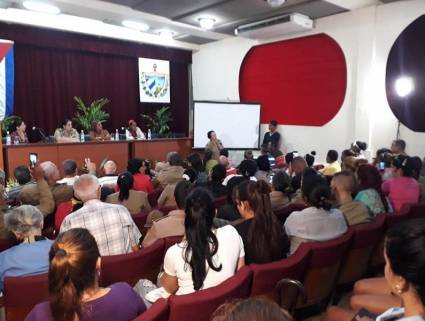
In the audience it was revealed that in the Women’s Voluntary Military Service duty and opportunity are combined for many young women Author: Zorileidys Pimentel Miranda Published: 26/11/2019 | 10:43 pm
PINAR DEL RÍO: The Women’s Voluntary Military Service (SMVF) is still a taboo in some Cuban families. Getting used to the boots, the olive green uniform, the backpack, the guards, the hikes, the days in the field, is very hard for women, according to many people.
However, there are families who are grateful that their daughters are living this experience. This was evident during the parliamentary hearing on the SMVF held on Tuesday in Pinar del Río, sponsored by the Committee on Defense and Internal Order of the National Assembly of People’s Power (ANPP).
The testimony of Odalys Orraca Castillo, mother of a young woman who was a member of the Border Brigade in Guantanamo, reached the audience. “It is always difficult to accept that a son is going to walk away. In our case, we already knew that our daughter was willing to comply with the SMVF and therefore there was an acceptance and we were all convinced that this was the best thing for her.
“The separation was difficult, but we remained calm because we always knew that they were well cared-for in every way. In the first two months after starting military service, my daughter told me: “Mom, don’t cry or worry anymore, because we are very happy; it is true that we have to work and do all the activities, but we also have fun, we have a good time, and above all, we learn a lot”.
Like this one, other stories came to the parliamentary hearing, which was attended by fighters of the Revolution, cadets, family members and representatives of various organizations and institutions from the territory.
Such was the case of Yusleidys Hernández Hernández, a member of the National Committee of the Young Communist League (UJC), who, for six months, learned what life is like in a military unit. “It was a unique experience for me. It contributed a lot to my training. Now I am more disciplined and consistent with the tasks of the Revolution. I feel great pride and satisfaction in being prepared to defend the country in any circumstance,” she said.
Then, she added that from the UJC, together with the Federation of Cuban Women, “We carried out exchanges in the educational centers, we showed videos about women who have lived this experience, we talked with the parents and we had concrete results.
For her part, Yilena Valdés Llano, a 19-year-old who finished her military service last August, said it was a 12-month apprenticeship. “I reached an incredible degree of maturity, it also taught me about military life, everything I need to know to defend the country. In addition, I was able to study and today I am in the first year of my degree in rehabilitation, something I am very passionate about.
Also participating in the hearing was Major General José Antonio Carrillo Gómez, president of the Defense Committee of the ANPP and of the Association of Combatants of the Cuban Revolution, who reiterated that at present, along with the economy, defense continues to be the great task of all Cubans to maintain our social system.
Cuba at the Rosa Luxemburg Conference

Cuba at the Rosa Luxemburg Conference
It’s Possible to Build a Socialist State of Law and Social Justice
Young Cuban deputy Yoerky Sánchez, a member of the Council of State and director of Juventud Rebelde newspaper, spoke on Saturday at the Rosa Luxemburg Conference in Berlin
Posted: Saturday 11 January 2020 | 09:41:29 pm. Updated: Saturday 11 January 2020 | 10:24:36 pm.
by Juventud Rebelde digital@juventudrebelde.cu
Translated and edited by Walter Lippmann for CubaNews.

Cuban deputy Yoerky Sanchez, member of the Council of State and director of Juventud Rebelde, explained to those present the measures that the United States is unleashing against Cuba. Author: Cuban Embassy in Berlin Published: 11/01/2020 | 09:31 pm
“Cuba shows that it is possible to build a socialist state of law and social justice, democratic, independent and sovereign, organized with all and for the good of all. Deputy Yoerky Sánchez Cuellar, on behalf of Cuba, explained that at the Rosa Luxemburg 2020 International Conference held on Saturday, January 11, in Berlin.
Invited by Junge Welt, a Marxist-oriented newspaper in German-speaking countries and a faithful ally of the Cuban struggle against the US blockade, Sanchez is also director of Juventud Rebelde laid out to those present the harsh economic pressures that the northern nation imposed on the Caribbean country in 2019. They reached a rate of one measure every seven days.
These measures, which included a strong communication factor, such as the campaign to discredit the Cuban medical collaborators, are a follow-up of the Blockade policy that the US government has maintained against the Caribbean country for 60 years. Sanchez explained: “The effect of this amounts to more than 138.8 billion dollars at current prices (…) It constitutes the main obstacle to the development of our nation,” said the Cuban deputy. “There is no sector of Cuban life that is unaware of the impact of this genocidal policy.

However, he said, “in the midst of the vicissitudes and deficiencies, Cuba exhibits a successful social model.
Likewise, referring to the destabilizing actions of the United States in the entire Latin American region, the Cuban congress member presented the recent events in Bolivia and Brazil as proof of the reactionary right’s attack on the continent’s progressive processes. He stated that the US government sells the neo-liberal model as a panacea and “demonizes anyone who confronts its dictates”.
Referring to Cuba’s position on issues such as the sovereignty of nations and the right to opt for a socialist system, the young Cuban said, “We advocate the right of each nation to determine its own political, economic, social and cultural system, without external interference or pressure. In this way, we reject the pretensions of Western powers to impose a single model of democracy, because this is not the patrimony of any country or region,” while assuring that Cuba “does not export its democratic model or try to give formulas to anyone.”

However, he emphasized, fidelity to our principles continues. “What we will never change is the will to continue building socialism.”
In this way, the voice and principles of Cuba were heard in an event in which intellectuals, politicians, scientists and artists from Europe, the United States, Latin America and the Middle East participate. Under the slogan Street Power – Struggle for the Future – Answering the Question of the System, is the largest conference of the left in Europe.
As in the 2019 edition, this 25th Rosa Luxemburg International was the scene of a demonstration of solidarity with the peoples of Latin America, including Cuba, Venezuela and in particular Bolivia.
Prior to his speech at the important event, the Cuban deputy held a meeting with representatives of leftist organizations in Germany. He thanked them on behalf of his country for the support provided in the fight against the bloody blockade of the island.

To 2020, Let’s Go Forward!

To 2020, Let’s Go Forward!
For young people, as for all of Cuba, 2019 has been a singular year, of many efforts, but also of surprising results that contribute to projecting new challenges for the immediate future
Published: Saturday 28 December 2019 | 09:52:20 pm
By Mileyda Menéndez Dávila, Odalis Riquenes Cutiño, Liudmila Peña Herrera, Javier Rodríguez Perera, Laura Brunet Portela, Iviani Padín Geroy, Zorileidys Pimentel Miranda, email: digital@juventudrebelde.cu
Translated and edited by Walter Lippmann for CubaNews.
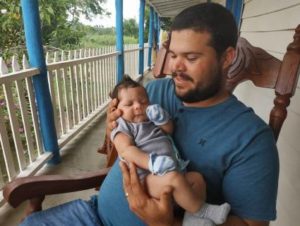
A child is the most beautiful thing you can have in life, says young farmer Hector Prieto Caraballo. Author: Zorileidys Pimentel Miranda Published: 28/12/2019 | 08:37 pm
The 2019 photo gallery is loaded with images that remind us of who we are and what paths we are on. We say “we are” in the present tense, because we understand that what we have experienced during the last 12 months has marked the national sentiment, the spirit and even the geography, in such a way that today, only hours before the arrival of 2020, it is very difficult to say “we were”, because much of what happened this year marks the paths or the roads that we must travel during the coming calendar year.
We must not forget that Cuba is the compilation of our daily poetry wrapped in kisses, sweat or tears, depending on its human beings and their circumstances. Cuba is the reality of each of our realities. Therefore, every achievement, every pending task, every goal – accomplished or to be accomplished – becomes the precedent for the next step.
A more than happy man
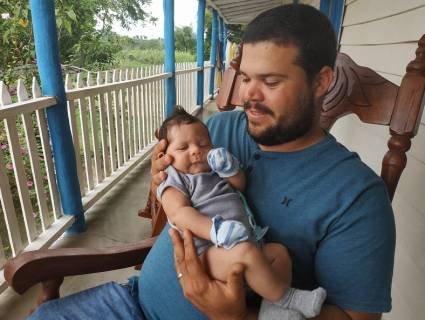
Héctor Prieto Caraballo knows this well. Only a month ago, he thought that the greatest happiness was limited to sunrise in the countryside, breathing pure air, working the land and enjoying its fruits.
That meant seeing his father, Héctor Luis Prieto, known as the Havana Man, happy, always glued to the ground to grow the leaves of what many call, not without justified chauvinism, the best tobacco in the world.
“Planting, picking tobacco, making bushes… everything is interesting, but planting is my favorite activity. Seeing that tiny stance grow gives me a very nice feeling because I can appreciate the results of my work,” explains Prieto Caraballo, a graduate of Técnico Medio en Agronomía.
But since last November 22nd, he knows that happiness is not only wrapped in green leaves, but it is also in the form of crying, gurgling, smiles, future. Happiness photography has a new and beloved face for the young man from Pinar del Rio.
“It is incredible the power that a smile of his has. A child is the most beautiful thing you can have in life,” he says proudly, adding, “I feel like a more than happy man. This is a year I will never forget: my first child, my family, the results in production. Everything has been very good for me.
Creativity in the face of obstacles
The same cannot be said of the promoters of restaurants in Havana, cocotaxi drivers or other means of transport dedicated to tourism, room renters and business owners who were affected in 2019 by the intensification of hostile measures by the United States government towards Cuba.
For them, this has been the year of economic cutbacks, of mutilated profits, of applying creativity as a solution to the ban on U.S. cruise ship travel to the Greater Antilles. This is how Raidel Regaiferos Sánchez feels -because he has lived it-. He has been working for more than a year as a promoter of the restaurant Habana Boulevard, in the capital city.
“When I started working here, the restaurant was full almost all the time, like the rest of this type in Old Havana. But when Trump decided to have the cruise ships say goodbye to the harbor in the bay, many of the promoters changed jobs, since the pay depends on the consumption by the diners who come to the restaurant.
Faced with such a complex panorama, which translates into less income for the development of the non-state sector. Though Trump says that every measure tries to [only] affect the Cuban government, Raidel and his colleagues have no other option but to appeal to creativity and the reformulation of commercial strategies in order to “fall in love” with clients and not close the deal.
“Since then, we’ve had to update prices and update the menu, as well as implement other alternatives when it comes to promoting the site, and adding national consumers”. He says who would be happy if 2020 would bring longed-for opportunities to prosper, without measures “from outside” that attempt to destabilize “inside.”
Hope for many

Still in young Martha Regla Beltrán Boza’s memory is the devastating tornado that destroyed her home.
Photo: Mileyda Menéndez Dávila
Martha Regla Beltran Boza believed that 2019 would be the worst year for her and her family. They’re known as “the Many” because it is a nucleus with 24 people from three generations, all born and raised on the slopes of Lenin Hill, in Regla.
On the night of January 27, Martha had gone out to the street because she wanted to eat peanuts, but something in the air disturbed her and she ran back to bed with her mother. Minutes later, the roofs of the tiny wooden house fell on them, and behind them a nearby Yagruma tree, uprooted by the strong winds of the tornado that destroyed several areas in five municipalities of the capital.
“Now the family was really out on the streets,” he thought. Fortunately, a neighbor provided his small home so that a part of “los Muchos” would be aware of the recovery of the property, taken up by the Julio Antonio Mella contingent, which in this case became practically the entire onstruction, from the foundations, of three two-story masonry houses.
“They made us up to the entrance corridor, which until then was made of earth,” she says with relief. Today, she is in the third year of a pre-university educational program and dreams of soon joining a primary school classroom to teach literature, which is her favorite subject.
The usefulness of virtue
In Santiago de Cuba, the young hands of José Ruberlandis Vázquez Enrys, Sayonara Destrade Castillo and Indira Jardines Durán bear the mark of the effort to be useful in the face of the challenges posed by difficulties. Their energy and enthusiasm have been decisive in promoting the idea of food production parks, a Santiago-based initiative that is already recognized in the country for reproducing the artisanal practices of traditional gastronomy on a large scale, with a minimum of electricity and zero diesel fuel.
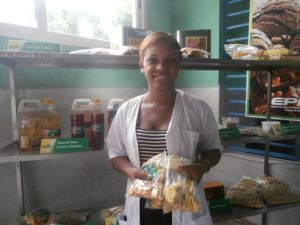
“The estate has allowed me to develop in the production of food for the people,” says Indira Jardines Durán. Photo: Odalis Riquenes Cutiño
The alternative came to life in March 2019, in areas of the Ice Cream Wafer Factory. It’s located on Patria Avenue. Saltine cookies of various types and 100% rice cookies, candies of various shapes and flavors, homemade mayonnaise, cakes and pancakes, cassava and cassava frying, peanut and coconut nougats, pru, vinegar, sweet and dry wine, liquors, fruit and hard chilled ice cream, cassava, raspberry, Cuban pasta, instant soda, breads and sweets with flour spreaders. These make up a varied amalgam of products that are highly appreciated by the consumers who receive them. This is both in an Ideal Market and in cafeterias and points of sale in the Santiago food industry. Ruberlandis, Sayonara and Indira feel the satisfaction of having dedicated these last months to producing food for their people, using natural fuel: coal, firewood, bagasse and coconut shells. For them, 2019 can be summed up in two words: to be useful.
A “busy” year

Massiel Cano Garcia says that 2019 was a year to show who today’s young people are. Photo: Laura Brunet Portela
“When the Young Communist League calls, when your university asks for a hand, when the president of the country himself trusts the young people and believes we can do more, then there is no one who is not motivated,” says Massiel Cano Garcia, a student in special education.
A pile of photos he has on his mobile phone show that 2019 was a very busy year: “It was full of proposals and opportunities to show who we are as young people today,” he says.
With his finger, he slides the snapshots of the productive activities that made his University one of the best: planting potatoes in the middle of a field, or giving away smiles at the pediatric hospital.
Massiel keeps memories of all those moments, to show that the energy of his youth is transmitted, transformed and produced. “Watching over the savings in the companies in my neighborhood was something I did to feel useful and help my country move forward,” he recalls.
“It wasn’t a question of reporting to anyone. We didn’t have plans or figures to accomplish in one day. It was just “making us feel”, making those who didn’t know how important it was to save aware of it. And she recalls that Prado went up and down in shops, bakeries, commercial establishments, companies and homes, inspiring people, winning hearts.
“The idea was to convince people that no matter how insignificant it might seem, a simple click also mattered,” says those who now dream of dedicating their lives to special education. “My greatest wish is to be a good teacher for children with special educational needs.
A high jump

For Luis Enrique Zayas, who became a starter at the Pan American Games in Lima, this year has been a sort of Copernican turn in his life. Photo: IAAF
For someone like Luis Enrique Zayas, who several times has considered not giving another drop of sweat for the sport he practices, still young but with several fiascos. This year has been a kind of Copernican turn for his life. With hardly any possibility of participating in the Pan American Games in Lima, almost ten days before their start, he was informed of their presence. Forecasts placed him far from the podium, but in the Peruvian capital the triumphant apotheosis took place.
It was on August 9 when the high jumper shattered all the speculations and became the biggest surprise of the Cuban delegation in Lima. He invaded the summit with the best of his life, a jump of 2.30 meters, three centimeters higher than his previous personal best, achieved in 2016 when, breaking the same predictions, he became the world youth champion.
“I concentrated a lot on the whole competition and that’s how that gold medal came out, something super big for me, my family and Cuban athletics. In the meantime, I qualified for the World Athletics Championships in Doha”, said the athlete from Santiago, who has realised that life is a stage of constant tests and he, as a “good actor”, emerged as a protagonist more than once.
In 2020, looking ahead
Diverse in nuances, complex because of the ups and downs and the obstacles; full of successes and sacrifices… 2019 is falling behind. Once again we close a cycle, but we remain with the list of what we have accomplished or what is still pending, in order to focus our gaze on what we want to mark our life since January 1st, always with the conviction that we hum along with the Buena Fe group: we will receive it “head-on” in 2020.
Chicharrones is Meat

I Still Think That Chicharrones is Meat
Chicharones contain high amounts of collagen and established fats that generally help to reduce cholesterol, diabetes and cardiovascular disease
December 28th, 2019
A CubaNews translation.
Edited by Walter Lippmann.

Experts conclude that chicharrones is a healthy food Author: Twitter Posted: 28/12/2019 | 03:13 pm
Numerous nutritionists, as well as food experts, claim that the delicious deep-firied crackling pork rinds is not only not fattening, but is even beneficial to health and should be included in many diets.
It is said that pork rinds have high amounts of collagen, so when you eat them you will feel full sooner, which will make you eat less and this helps you lose weight.
It is also high in so-called established fat, which helps reduce cholesterol, diabetes and cardiovascular disease, and generally improves bone health. It also contains a lot of protein. One ounce (28 grams) of this food provides 17 grams of protein, which maintains the feeling of satiety and benefits the muscles. On the other hand, it has stearic acid, a saturated fatty acid that does not raise blood cholesterol levels, according to the website Meatinfo.co.
This food, which is eaten in many parts of the world – in Cuba almost all year round – is presumed to have been invented during the 1800s by the working-class communities of Savy in the West Midlands, or the Western Midlands, one of the 47 counties of England, UK, with its capital in Birmingham.
Like almost all fried and salted meat snacks, chicharrones are delicious. Recently, the company Muscle Food released chicharrones that are claimed to have the highest protein content of any chicharrones in the world. Their product is made from fried pork skin sprayed with salt and 70 percent of its nutritional content is protein, plus it has half the fat of pork rinds on the market.
Olympic gold medalist in taekwondo, Jade Jones, is known to like them a lot. And if an Olympic medalist consumes them regularly, it means they’re healthy. Also, according to Vice magazine and Milenio.com, most of the fat in pork rinds is mono and polyunsaturated.
St. George’s Hospital’s chief nutritionist, Cath Collins, confirmed that because what we eat is the collagen concentrated in the pig’s skin, pork rinds have an incredibly high protein content that maintains the feeling of satiety, benefits the muscles and improves bone health.
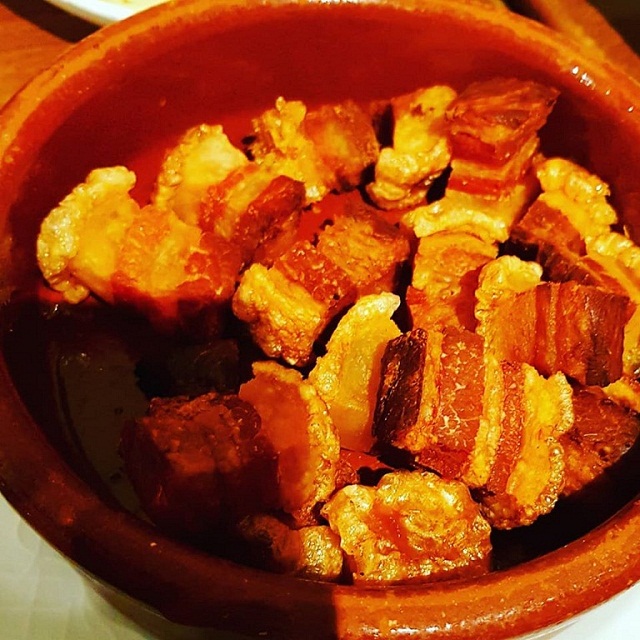
Chicharrones is not harmful. Photo:taken from Twitter.
It turns out that lard [manteca de cerdo] is healthy
On the other hand, research conducted by Dr Michael Mosley and published by BBC News revealed that what we thought we knew about cooking oils was simply wrong. Most people believe that frying with vegetable oils has to be healthier than cooking with animal fat. The problem is that when fats and oils are heated they change, and in doing so produce chemicals that can cause heart disease or cancer.
Olive oil, for example, has a so-called lower smoke point, which means it will begin to change more quickly. The beneficial compounds then begin to degrade and potentially harmful compounds are formed. Sunflower oil, supposedly the healthier alternative, is much worse. Therefore, lard, so stigmatized in common use, is preferable to these oils in general, experts explain.
Nutritionist Mariana Rodríguez Pineda explains that the tendency to point to certain foods as being fattening — or not — is questionable. Any excess calories consumed in a day can cause us to gain weight, she says. There is no one food that, by itself, will make us gain or lose weight; what matters, after all, is the amount of energy you consume and the amount you spend, she says.
According to Rodríguez Pineda, the belief that chicharrones are not fattening comes from supporters of ketogenic diets, which are characterized by high amounts of protein and fat, and little or no carbohydrates.
Pork rinds, which are of animal origin, are permitted in this type of diet. For all these reasons, Rodriguez assures us that there is no better diet than a balanced one that includes carbohydrates, fats and proteins, since restricting one of the three nutrients can be harmful to health.
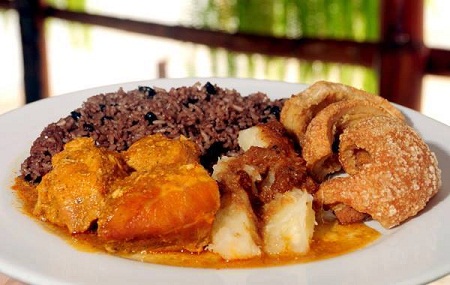
Lard is healthy. Photo: taken from twitter.
Subscribe to Blog via Email
| M | T | W | T | F | S | S |
|---|---|---|---|---|---|---|
| 1 | ||||||
| 2 | 3 | 4 | 5 | 6 | 7 | 8 |
| 9 | 10 | 11 | 12 | 13 | 14 | 15 |
| 16 | 17 | 18 | 19 | 20 | 21 | 22 |
| 23 | 24 | 25 | 26 | 27 | 28 | |

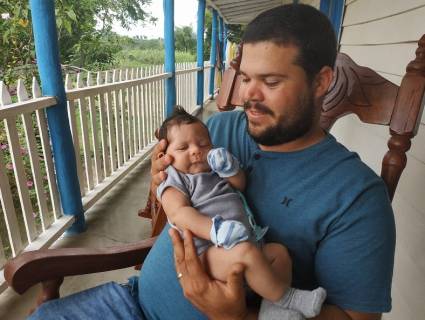
You must be logged in to post a comment.